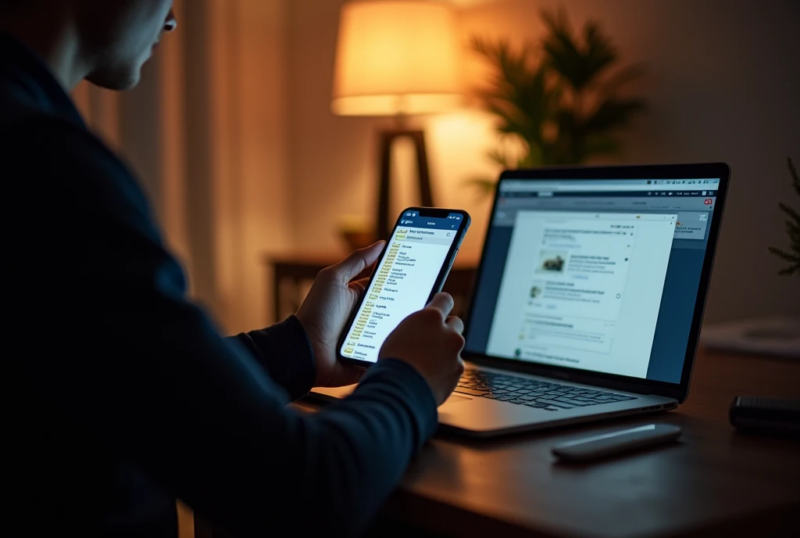
Have you ever thought, “I’m just browsing; nothing will happen”? Or maybe you’ve quickly clicked “accept” without reading your agreement.
We’ve all done that. But now, more than ever, it’s good to be a bit smarter online. Even small things we do for convenience, like skipping a few safety steps, can sometimes open up our data to others.
Now, don’t worry, this isn’t about scaring anyone. It’s about simple ways to stay safer online without making life complicated.
Let’s look at common shortcuts people take, and how you can still enjoy a fast, easy internet experience while keeping your identity safe.
Quick Logins Can Wait, Let’s Talk About Strong Passwords
Before getting into the habit of saving passwords everywhere, it helps to pause and think for a second. Saving passwords in browsers feels quick, right? But what helps even more is using a good password manager or at least creating your strong passwords that are not easy to guess.
Instead of “123456” or your name with a few numbers, go for a mix, try something like “TeaLover786!”. It’s random, but you’ll remember it. Write it in a small notebook if you need to, just keep it somewhere only you can find.
It’s not about being perfect, just a little extra careful.
Public Wi-Fi? Use It the Smart Way
Public Wi-Fi at cafes, airports, or parks feels helpful when your data is low. It’s okay to use it, but always pair it with a tool that gives you extra privacy. A virtual private network (VPN) helps keep your information protected while you’re connected outside your home.
Using a free VPN is a smart idea if you’re new to all this and just need something basic. It adds a good layer of privacy to your online activity, especially when you’re using free internet.
Just remember, when you’re online using public Wi-Fi, try to avoid logging into sensitive accounts like banking. Save those for later when you’re on a private network.
Pop-Ups, Offers, and Quick Installs? Let’s Slow Down a Bit
We all get tempted by those pop-ups: “Win a new phone,” “Install this to clean your system,” or “Click here for faster internet.” But before you click, it’s worth taking a breath. Most of the time, we don’t need those extra tools.
If you ever feel curious about any offer, it’s better to search for it separately instead of clicking right away. Just that small step can make a big difference.
Also, before installing any app or tool, just check a few user reviews or visit the official website. This little habit helps you avoid tools that may ask for too much personal information.
Multi-Factor Authentication: Two Steps Are Better Than One
Yes, entering another code might feel like an extra chore. But this two-step login method, known as multi-factor authentication (MFA), adds another wall between your data and people who shouldn’t access it.
Think of it like having both a lock and a bolt-on your door. It’s still your home, just safer.
Most apps and websites now give you this option. It usually takes less than 20 seconds and keeps your info more secure. That’s time well spent.
Keep Your Software Updated, Yes, Really
It’s easy to click “Remind me later” when an update message pops up. But these updates are not just about new features. Many of them fix small issues that could leave your system open.
When your device or app says it needs an update, let it run. Even setting your device to auto-update can save you the headache of doing it manually each time.
Again, it’s all about small habits that work quietly in the background.
Think Before You Share Too Much Online
Sometimes we post a bit more than needed, our pet’s name, our birthdate, and a picture of our first car. These little details can be guessed and used in password resets or security questions.
It doesn’t mean you should stop sharing. Just pick what feels okay to post and what’s better kept personal. A good idea is to make your social media accounts private if you’re not comfortable with everyone viewing your posts.
Even small adjustments to your privacy settings can help.
Backups, Your Data’s Best Friend
You don’t need anything fancy. Even a small external hard drive or cloud storage option works well.
Backing up your data regularly is just like keeping a photocopy of your important papers. If anything ever gets lost, you can bring it back without a panic.
Some people like to back up once a week, others do it monthly. It depends on how much stuff you usually store or create. But trust this, it feels nice to know you’ve got a backup just in case.
Use Simple Security Tools That Do the Work for You
You don’t need to be a tech expert to stay safe online. There are tools made for regular folks who just want their information kept private.
Basic firewalls, antivirus software, and a good free VPN can all work together to create a safe setup. Most of these tools come with easy instructions and quick setup. Once done, they quietly do their work while you enjoy your browsing, shopping, or working online.
The key is not to ignore these tools. They’re not heavy or slow anymore; they’re smart, light, and built for everyday use.
Be Curious, in a Good Way
One of the best things anyone can do for online safety is to stay curious. Ask questions like, “Why does this app need access to my photos?” or “What information am I agreeing to share?”
You don’t have to read long privacy policies. Just a quick check on permissions, app reviews, or even asking a friend can help. This way, you stay aware of what you’re using without getting too technical.
Being mindful doesn’t mean being afraid; it just means being a little wiser with your clicks.
Stay Calm and Smart Online
There’s no need to stress about everything. Cybersecurity sounds like a big topic, but it comes down to small everyday actions.
By taking a few simple steps like using stronger passwords, setting up two-factor authentication, staying aware of what you click, and using helpful tools like a free VPN, you’re already doing more than enough to protect your digital identity.
And if you forget something now and then, that’s okay. The internet isn’t going anywhere, and there’s always a way to make it better and safer the next day.
Conclusion
So next time you’re online and faced with a shortcut, maybe it’s a saved password, a quick install, or using public Wi-Fi without any safety net, just take a moment to think.
It’s all about balance. You don’t have to change everything. A few small shifts can help you enjoy the internet just the way you like, easy, smooth, and peaceful, without giving away too much of yourself.



